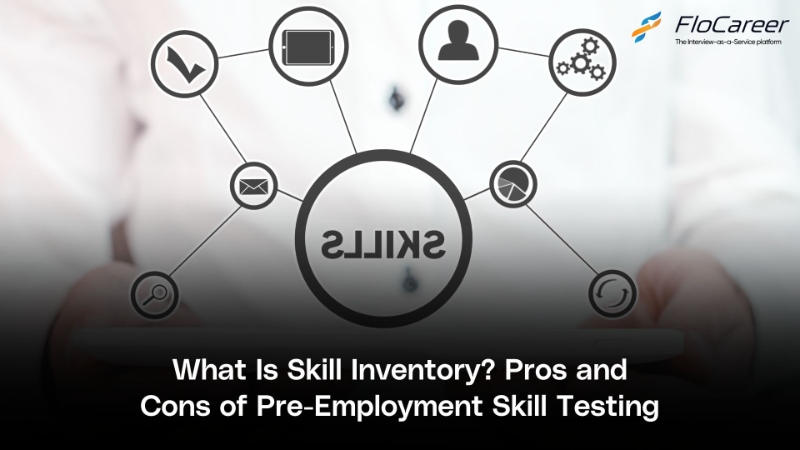What Is Skill Inventory? Pros and Cons of Pre-Employment Skill Testing
The success of any company is intricately tied to the caliber of its employees. A high-performing team can be the driving force behind prosperity, while poor hiring decisions may pave the way for challenges. In the competitive realm of recruitment, where the stakes are high, ensuring that your company attracts and selects the best candidates is paramount. One method gaining prominence in this pursuit is pre-employment skill testing.

Read: Unleashing the Power of Flocareer's Virtual Interview Platform
Decoding Skill Inventory: A Strategic HR Asset
What is Skill Inventory?
A skills inventory is the HR department's strategic tool for cataloging and monitoring the skills and capabilities within their workforce. It involves creating a detailed record of each employee's skills, serving to identify strengths, areas for improvement, align employees with suitable roles, recognize training needs, and shape career development plans.
Purpose of Skill Inventory:
The purpose is twofold - recognizing and monitoring individual or collective skills and competencies. It aids in evaluating strengths, identifying areas for improvement, uncovering training opportunities, and aligning individuals with roles that match their specific skill sets.
The Power of Pre-Employment Skill Testing
10 Reasons For Pre-Employment Skill Testing in Hiring:
1. For those hesitant about incorporating pre-employment skill testing, here are compelling reasons:
2. Effective Screening: Weed out up to 50% of unqualified applicants during initial screening.
3. Time Efficiency: Cut down up to 90% of time spent on extraneous elements in the hiring process, contributing to cost-saving.
4. Increased Satisfaction: Witness a remarkable 75% increase in satisfaction among hiring managers.
5. Enhanced Success Rate: Potentially double your success rate in hiring the right candidates.
6. Productivity Boost: Streamline the process, allowing focus on critical activities and enhancing overall productivity.
7. Quality Candidate Selection: Enhance the probability of selecting high-quality candidates.
8. Ideal Job Fit: Achieve the ideal job fit, leading to increased satisfaction, productivity, and reduced turnover.
9. Legal Mitigation: Mitigate legal risks by ensuring test validity, avoiding disparate impacts, and applying tests consistently.
10. Equal Opportunity: Offer all candidates an equal opportunity to demonstrate qualifications beyond resumes.
Read: The Benefits and Uniqueness of the Interview as a Service Platform
Objective Decision-Making: Minimize personal bias with scientific test results for more objective decision-making.
Pros And Cons of Pre-Employment Skill Testing
Debating Effectiveness:
The debate on the effectiveness of pre-employment skill testing is valid. While testing doesn't guarantee the best candidate, it provides deeper insights into candidates' skills, aiding in a more informed decision. Without testing, the risk of inadequate understanding of a candidate's abilities may increase.
Cracking the Code: Understanding Skill Inventory in HR
Unlocking the Power of Skill Inventory
Strategic Workforce Planning: Skill inventory isn't just about listing skills; it's a strategic tool for workforce planning. By identifying current skill sets, HR can proactively plan for future needs, ensuring the organization has the right talent pool for upcoming challenges.
Succession Planning: Delving into skill inventories aids in succession planning. It enables HR to identify potential leaders within the organization by assessing not only current skills but also leadership qualities and the ability to adapt to evolving roles.
Training and Development Roadmap: Skill inventory acts as a compass for crafting tailored training and development programs. By understanding the existing skills and skill gaps, HR can design initiatives that enhance the overall skill competency of the workforce.
Agile Role Assignments: In dynamic work environments, roles can evolve rapidly. Skill inventories empower HR to make agile role assignments, ensuring that employees are placed in positions that align with their evolving skill sets.
Team Formation for Projects: When projects demand a specific skill set, skill inventories become instrumental. HR can swiftly assemble project teams by matching individuals with the required skills, ensuring project success through a harmonious blend of expertise.
Identifying Cross-Functional Potential: Beyond individual skills, skill inventory facilitates the identification of employees with cross-functional potential. It becomes a roadmap for creating a versatile workforce capable of contributing to various aspects of the business.
Enhanced Employee Engagement: Employees appreciate when their skills are acknowledged. Skill inventory discussions foster engagement by recognizing and valuing the diverse skill sets employees bring to the table, creating a positive work environment.
Aligning Employee Goals: By integrating skill inventory insights into performance discussions, HR can align individual goals with organizational objectives. This strategic alignment ensures that employees are working towards acquiring skills that contribute to the company's success.
Data-Driven Decision Making: Skill inventory transforms HR into a data-driven powerhouse. Utilizing analytics derived from skill data, HR can make informed decisions on hiring, training, and talent management, contributing to overall organizational effectiveness.
Mitigating Skills Obsolescence: Industries evolve, and so do skill requirements. Skill inventories help in identifying skills that might become obsolete. HR can proactively address this by planning reskilling or upskilling initiatives to keep the workforce relevant.
Navigating the Hiring Landscape: The Final Verdict
Final Thoughts:
Pre-employment skill testing is not a definitive answer but significantly enhances informed decision-making. It offers valuable data to gauge a candidate's suitability, reducing uncertainty. The choice depends on organizational needs, job nature, and confidence in the hiring process.
Essential Skills and Competencies:
Attributes like attention to detail, time management, cognitive thinking, problem-solving, and learning agility are universally valuable. Tailoring assessments to job-specific needs saves time and money.
Exploring FloCareer:
In the realm of skill testing, consider exploring FloCareer's pre-employment testing services. With over 200 ready-to-use skill tests and the flexibility for custom tests, FloCareer streamlines hiring, identifying high-quality candidates while minimizing administrative complexities. Outsourcing interviews with FloCareer ensures not just efficiency but also unbiased evaluations, contributing to diverse and skilled workforce development. Embrace these strategies, and FloCareer, for unparalleled success in talent acquisition.
Read: FloCareer raising a bar in improving the candidate experience during technical hiring


